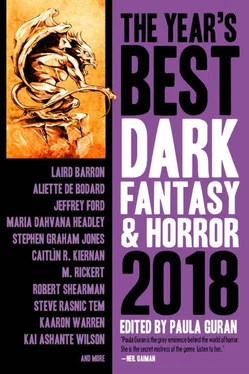He staggered backwards and slipped on one of the plant leaves. He fell into a nest of swollen stems. The smell of mother’s tears rose like a terrible seduction. His mouth flooded with juices, all red and raw. To deny them, he tore up a fistful of flowers and sank his teeth into their centers. That sweet, brackish slime burst across his tongue and he drank it down. Now his stomach railed against the stew of textures mingling in his gut and he felt his back arch violently as he regurgitated his meal. Before darkness became absolute, he was able to gaze upon his mess and discern, within the half-digested lumps and granules, the wet gleam of a wedding band upon what was left of a finger.
Moon Blood-Red, Tide Turning
Mark Samuels
Of course what took place back then wouldn’t have seemed so disturbing had I not encountered her again just over two decades later. At that earlier time, you must realize, there was more of the farcical than the horrible in what transpired, or so I supposed.
I was only twenty-four, and when I think of myself as I was then, I realize how much of a stranger that younger man appears to me now. The memory of his hopes, his dreams, his view of life, all fill me with contempt. He would hate this future self, and regard me as a usurper.
But there are worse fates than regret.
And I believe I discovered one of them.
After a handful of jobs, none of which I particularly enjoyed and each lasting less than a year, I found myself employed at a small publishing house in Fitzrovia, close to its local landmark, the British Telecom Tower. The business specialized in what are termed “acting editions,” which are stage plays that are designed for the use of actors rather than the general reader. The only real difference is that these editions usually contain the likes of a furniture and property list, a lighting plot, and an effects plot, all printed after the play text itself and which are there to assist the director and the stage crew. My activities at this firm were in the department that licensed performance rights to companies who wished to mount productions of our titles, and for some reason (the job had little interest for me), I stayed on.
Perhaps I remained because the other staff were invariably interesting, coming from a theatrical background, and there was a high turnover of them. Aside from the board of directors, who had been there for decades, almost everyone else came and went within a few months. As you might imagine, a large proportion were “resting” actors, and as soon as a new role came up they handed in their notice and disappeared. Some returned and then left again, some didn’t, though I have to confess that only one or two out of the multitude ever achieved anything close to prominence in the theatrical world.
One of these “resting” actors employed by the publishers was a young woman whom I shall call “Celia Waters.” It is not her real name, naturally, but that detail is of no consequence.
We struck up an acquaintance of sorts. It was easy to do so, since the business was quite generous in subsidizing its staff to see performances of new plays that might be suitable for its publishing list. Often too, of course, free tickets were provided to the firm by the playwright’s agents. It was regarded as a staff perk I suppose, since their wages weren’t exactly generous. I accompanied Celia Waters on two or three occasions to shows playing in London, sometimes just the two of us, sometimes with other staff members.
One time, after a long evening (a play I have forgotten and post-performance drinks at a pub I can’t recall) I even ended up spending the night back at her flat in Shepherd’s Bush. We didn’t sleep together. I am not sure that either found the other sexually desirable. She was attractive in her own way, slim, petite, with long black hair and by no means without personal charm, but there was no chemistry between us.
And over breakfast at a nearby cafe the next morning she told me she was going to be leaving the publishing firm in a month to take up a part in a brief run of a new play being staged down in Cornwall.
She said it was being put on by a new repertory company rim by a wealthy theatrical auteur .
I can’t say that any of this was of great interest to me, and I asked in the spirit of polite enquiry, though I was genuinely curious, as to where it was going to be staged. There aren’t exactly a large number of playhouses in Cornwall and the most likely venue had already suggested itself to me. I had a Cornish cousin with a cottage down in Sennen Cove whom I visited once or twice a year, located only a mile or so from Porthcumo, the site of the Minack Theatre. Moreover, I was due to visit him when Celia Waters would also be in the area.
“Is it the Minack Theatre?” I asked her.
“Why, yes it I,” she replied. “Do you know it?”
This coincidence of our being in more or less exactly the same place at the same time gave an outside impetus to our continued association. Frankly, when she first told me she was leaving the publishing company I assumed our brief, unconsummated relationship would dissipate of its own accord, as they often tend to do with two people in their early to mid-twenties, neither of whom wants commitment.
I promised that I would come and see her in the play while I was down there, and she was keen for me to do so, presumably with a view to the idea of its being reported on favorably and published by the firm. I didn’t think there was much chance of that, since the business only really took on plays that benefited from a higher profile, but I didn’t voice the thought.
Still, I asked her to tell me about it.
“Well,” she said, “it’s all rather a mystery really at this point. We have had some formulaic rehearsals for the last couple of weeks here in a space above a pub. It’s all very ritualistic. But definitely cutting-edge and experimental.”
It sounded awful. Like something a group of students obsessed by Berkoff would try and put on.
Over the next few weeks I saw next to nothing of Celia Waters. We didn’t work in the same department; she was in the showroom on the ground floor and I was up on the second floor in the licensing department anyway, but we exchanged pleasantries whenever our paths crossed. I felt as if we had already disengaged from one another.
One day she wasn’t there at all. A director told me she had quit a week earlier than planned and had already gone down to Cornwall.
“Actresses, eh?” he said.
Back then even female actors themselves used the term.
I will admit that I didn’t really feel anything much about her having left early and without telling me. My only worry was whether or not I was still obliged to keep my promise to go and see her in that play at the Minack. I knew she was primarily interested in my being there for her own reasons, to the benefit of the play itself, but I decided to delay the decision until I was down in Cornwall myself.
Perhaps the most grueling thing about deepest Cornwall, if you are traveling from London, is the train journey itself. For some reason—and I had never shaken it off, despite several trips there—I had the feeling that it always took longer than one might reasonably expect from looking at a map. After four hours one gets to Exeter in Devon and from there one soon crosses the Tamar into Cornwall and imagines it can only be another ten or twenty minutes more to Penzance. It’s not, it’s another hour. And it’s this last hour that’s the most trying, because it seems so unexpected, as if the region itself extends time to fox outsiders. Of course one recognizes it’s an illusion, but it’s no less disconcerting even when one admits the fact. My cousin had an apposite phrase he would often use in jest and whose use he solemnly advised me marked out a true Cornishman. It was, when asked to do a thing, that a Cornishman would reply that it would be attended to “dreckly” which means not attended to directly at all, but rather in one’s own good time. I suppose, too, that this warping of time was brought to mind most noticeably when one returned to London from Cornwall, because it then seemed that everyone and everything in the metropolis rushed around insanely to no useful purpose.
Читать дальше












